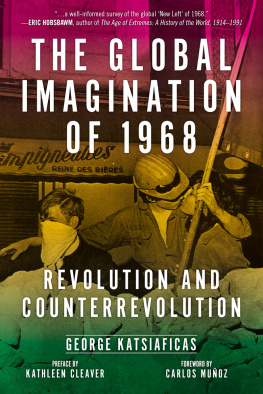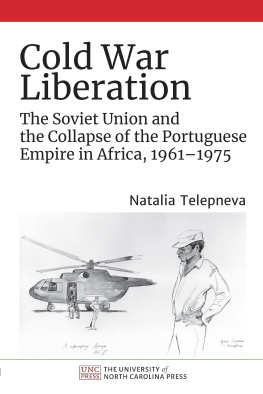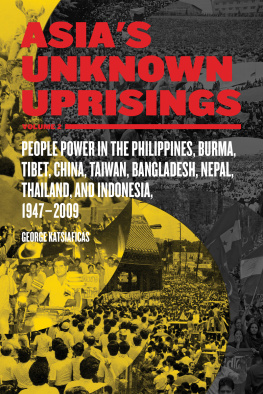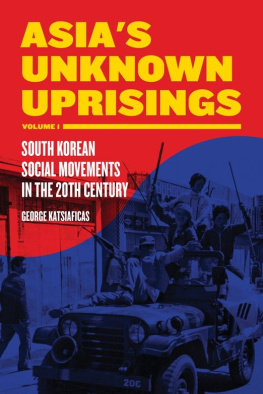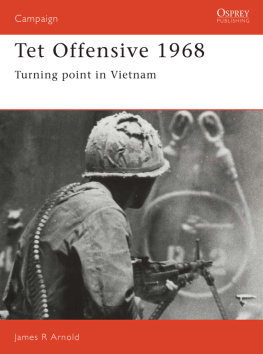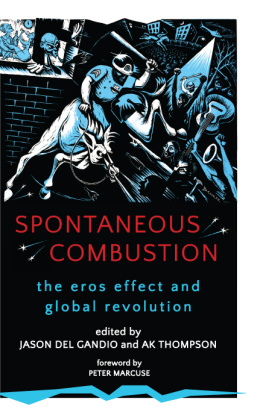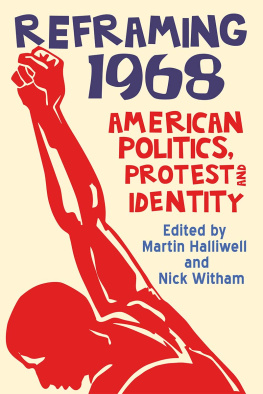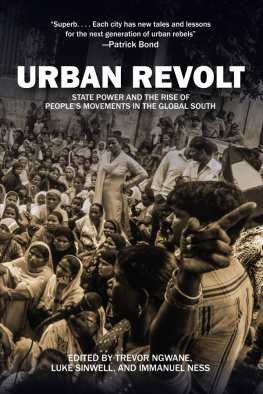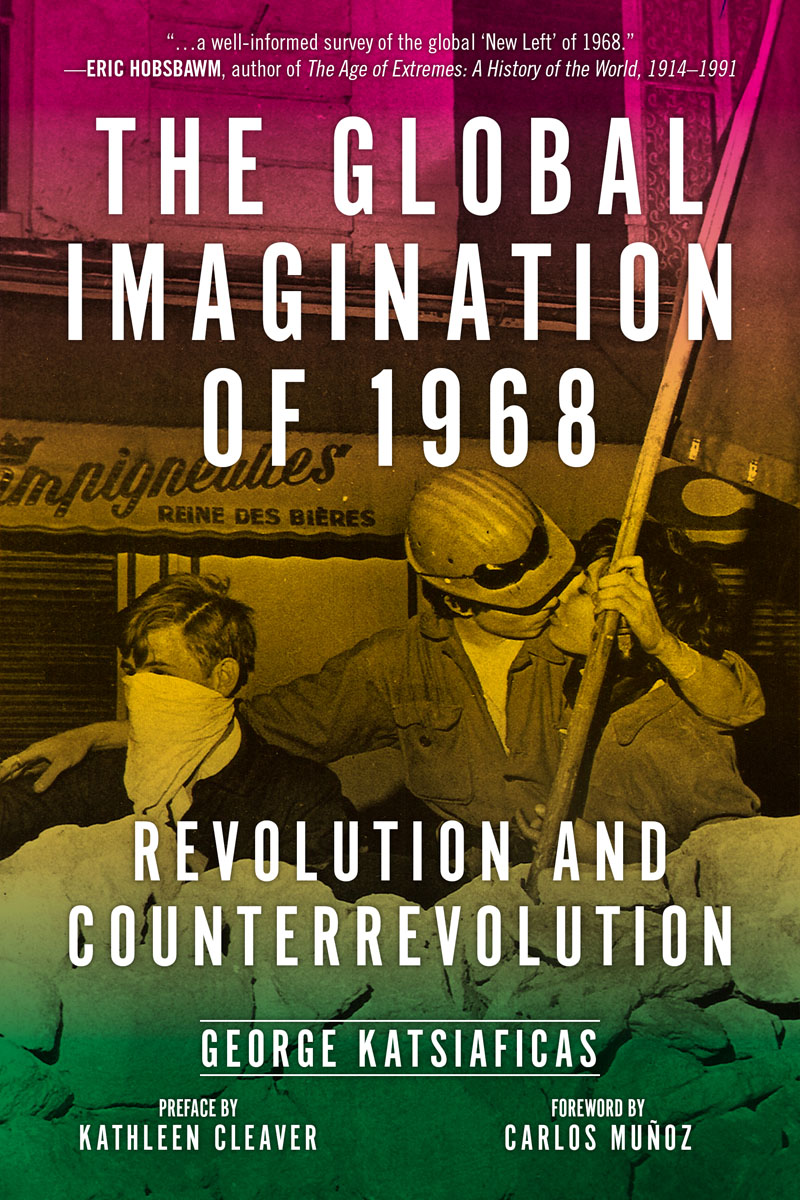
Praise for The Global Imagination of 1968
A well-informed survey of the global New Left of 1968.
Eric Hobsbawm, author of The Age of Extremes: A History of the World, 19141991
George Katsiaficass work presents an understanding how we of the New Left used our education as a practice of freedoms: confronting the racist, warmongering status quo with the objective of creative participatory democracy. As we continue to work toward cooperational humanism here at home and the world over, this insightful analysis provides a useful backdrop for social activism and the struggle for future democratic human rights.
Bobby Seale, former chairman and cofounder of the Black Panther Party
This is the best book on the New Left, the only truly global history that historicizes the social movements of the 1960s. It is both a cautionary tale and a guide for dark times that require imaginative resistance. This new edition could not have come at a better time.
Roxanne Dunbar-Ortiz, author of Outlaw Woman: A Memoir of the War Years, 19601975
By including feminism prominently in the global insurgency of 1968, this book gives us comprehensive understanding of the broad mobilization that was at the heart of the movement. Everywhere in the world, people simultaneously challenged wars, racism, and archaic politics and also patterns of domination in everyday life.
Mariarosa Dalla Costa, professor emerita, University of Padua, and theorist of Wages for Housework
Of all the many studies of the wave of radicalism marking the so-called long sixties, The Global Imagination of 1968 ranks among the very best. Nothing else rivals the lucidity and succinctness with which Katsiaficas captures not only the liberatory vision but the sheer vibrancy with which the periods global movement was imbued. The book should be considered essential reading by all who seek transformative change.
Ward Churchill, author and activist
The year 1968 stands out as a pivotal moment in history, a high point of worldwide revolutionary consciousness, an unbreakable chain of resistance and rebellion. Whether in Asia, Africa, Europe, Latin America, or the belly of the imperialist beast (USA), oppressed people were reclaiming their dignity and humanity. When 1968 is mentioned, I think most profoundly of our partythe original Black Panther Party, which raised to new heights the multiracial slogan of All Power to the People! Read this book and you too will discover the eros effect or revolutionary love that is so necessary in the age of neoliberalism and global capitalist tyranny.
Shaka Zulu, chairman, New Afrikan Black Panther Party
It is heartening to see how George Katsiaficas, a radical who has neither dropped out nor burned out, and whose scholarly research grew out of his own activism as a student in the late 1960s and early 70s, has incorporated in his vision an enlarged sense of the necessity for genuine revolution [to be] based upon the universal interest of the human species and all life.
Denise Levertov, poet and activist
Here the New Left is convincingly portrayed for what it was, a profoundly influential world-historical movement.
Stewart Edward Albert and Judith Clavier Albert, editors of The Sixties Papers: Documents of a Rebellious Decade
This book is a must for those contemplating future struggles for change. It gives a vivid picture of what actually took place as well as an idea of where we fell short so that in the next stage of struggle we can build on strengths and weaknesses and grapple with the even more profound questions that face us.
James Boggs and Grace Lee Boggs
I met George Katsiaficas in Berlin in the early 1990s and we took part in the demonstrations of revolutionary May 1 in Kreuzberg. His book on the New Left and 1968 gave me long-lasting connections between the West Berlin Autonomists and the theory and practice of the global revolt at the end of the 1960s. This book has at least a convincing message: Beyond your own plate! This shall be the life-elixir of every autonomous individual in the world. To this the free intellectual George Katsiaficas has made a compelling contribution.
Geronimo, author of Fire and Flames: A History of the German Autonomist Movement
The Global Imagination of 1968: Revolution and Counterrevolution
2018 George Katsiaficas
All proceeds received by the author will be donated to the Eros Effect Foundation.
ISBN: 978-1-62963-439-5
Library of Congress Control Number: 2017942912
Cover by John Yates/stealworks.com
cover photo from Photo, hors-srie no. 128: Spcial: Les indits de Mai 68 (May 1978).
Layout by Jonathan Rowland
PM Press
PO Box 23912
Oakland, CA 94623
www.pmpress.org
10 9 8 7 6 5 4 3 2 1
Printed by the Employee Owners of Thomson-Shore in Dexter, Michigan.
www.thomsonshore.com
F OR H ERBERT M ARCUSE AND J ANG D OO-SOK, MY TEACHERS, FRIENDS, AND COMRADES
T ABLES AND M APS
Contents
F OREWORD
by Carlos Muoz
I T IS A PLEASURE TO BE PART OF THE SECOND EDITION OF G EORGE Katsiaficass book The Imagination of the New Left: A Global Analysis of 1968. I consider it to be a classic study of the social movements that became dramatically visible in what is widely considered the key year of the 1960s. During that era I became a leader of one of those movements that came to be known as the broader Chicano movement. Prior to the publication of the first edition of the book, it was an invisible movement because previous books on the New Left had ignored its existence. The Katsiaficas book was the first to acknowledge it.
The books focus on 1968 is personally very significant to me because I had a life-changing experience that year. I was a Vietnam Warera veteran attending college on the GI Bill and a first-year graduate student activist involved in the antiVietnam War movement. I was also president of the United Mexican American Students (UMAS) and became one of the organizers of student walkouts to protest the racism Chicano students faced in the barrio high schools of East Los Angeles. The protest turned out to be the first major Chicano mass protest action against racism in U.S. history, and it ignited the emergence of the Chicano civil rights movement in the Southwest.
Over ten thousand students walked out of their de facto segregated barrio high schools in East Los Angeles. The walkouts lasted a week and a half and practically shut down the schools. The major students demands were that the school board fire all racist teachers and staff, hire Latino teachers and staff, teach courses about Chicano history and culture, and afford Chicano students the opportunities to enroll in college prep courses. At that time in history, Chicanos had the highest dropout rate in the city. The consequence was that instead of having the option to pursue a college education, many male students were drafted into military service. They suffered the highest casualties of any racial/ethnic group in the trenches of the Vietnam War. I had been one of those drafted a year out of high school but fortunately ended up serving in South Korea instead of Vietnam, where more than likely I would have been part of the casualty list.
My life-changing experience occurred after the student walkouts ended. I was one of the thirteen Chicano civil rights activists who had organized the student walkouts and were arrested after the Los Angeles Grand Jury charged us with conspiracy to disrupt the largest school district in the nation. I was thrown into an overcrowded cell with men who had been arrested on felony charges of murder, bank robbery, and rape. The county district attorney Evelle Younger, who had previously been one of FBI Director J. Edgar Hoovers top agents, had redefined organizing protest meetings as a conspiracy to commit misdemeanors and thus a felony crime. Each one of us faced sixty-six years in prison if found guilty. We did not know it at that time, but we were victims of the FBI Counterintelligence Program (COINTELPRO) and were not granted our First Amendment rights. Perhaps J. Edgar Hoover thought Chicanos did not qualify for constitutional rights. In 1970, two years after our arrest, the California State Appellate Court ruled we were innocent by virtue of the First Amendment of the U.S. Constitution.
Next page
